Deck 8: Introduction to Amplifiers
Question
Question
Question
Question
Question
Question
Question
Question
Question
Question
Question
Question
Question
Question
Question
Question
Question
Question
Question
Question
Question
Question
Question
Question
Question
Question
Question
Question
Question
Question

Unlock Deck
Sign up to unlock the cards in this deck!
Unlock Deck
Unlock Deck
1/30
Play
Full screen (f)
Deck 8: Introduction to Amplifiers
1
Which BJT amplifier configuration typically provides the lowest input impedance?
A) The common emitter amplifier
B) The common base amplifier
C) The common collector amplifier
A) The common emitter amplifier
B) The common base amplifier
C) The common collector amplifier
The common base amplifier
2
An amplifier with a value of Av = 20 dB. What input voltage is required for the amplifier to provide an 8.5 V output?
A) 850 mV
B) 85 mV
C) 425 mV
D) 186 mV
A) 850 mV
B) 85 mV
C) 425 mV
D) 186 mV
850 mV
3
An amplifier has signal values of vin = 30 mV and vout = 1.8 V. What is the voltage gain of the amplifier?
A) 30
B) 0.06
C) 60
D) 54
A) 30
B) 0.06
C) 60
D) 54
60
4
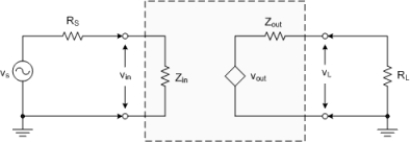
An ideal amplifier has Zout.
A) infinite
B) low
C) zero
D) high

Unlock Deck
Unlock for access to all 30 flashcards in this deck.
Unlock Deck
k this deck
5
An amplifier is driven by a 200 mV source with an internal resistance RS) of 50 Ω. If Zin is 150 Ω, what is the value of vin?
A) 600 mV
B) 66.7 mV
C) 50 mV
D) 150 mV
A) 600 mV
B) 66.7 mV
C) 50 mV
D) 150 mV

Unlock Deck
Unlock for access to all 30 flashcards in this deck.
Unlock Deck
k this deck
6

An ideal amplifier has Zin.
A) infinite
B) low
C) zero
D) high

Unlock Deck
Unlock for access to all 30 flashcards in this deck.
Unlock Deck
k this deck
7
Which BJT amplifier configuration typically provides the highest power gain?
A) The common emitter amplifier
B) The common base amplifier
C) The common collector amplifier
A) The common emitter amplifier
B) The common base amplifier
C) The common collector amplifier

Unlock Deck
Unlock for access to all 30 flashcards in this deck.
Unlock Deck
k this deck
8
An amplifier draws 1.8 W from its dc power supply and delivers 250 mW to its load. What is the efficiency of the amplifier?
A) 45%
B) 13.9%
C) 87.8%
D) 12.2%
A) 45%
B) 13.9%
C) 87.8%
D) 12.2%

Unlock Deck
Unlock for access to all 30 flashcards in this deck.
Unlock Deck
k this deck
9
An amplifier has values of Av = 300 and vout = 2.63 V. What is the magnitude of the amplifier input voltage?
A) 786 mV
B) 8.77 mV
C) 8.77 μV
D) 114 mV
A) 786 mV
B) 8.77 mV
C) 8.77 μV
D) 114 mV

Unlock Deck
Unlock for access to all 30 flashcards in this deck.
Unlock Deck
k this deck
10
An amplifier with an efficiency rating of 18% draws 3.25 W from its dc power supply. What is the maximum power it can deliver to its load?
A) 585 mW
B) 55 mW
C) 18 W
D) 58.5 mW
A) 585 mW
B) 55 mW
C) 18 W
D) 58.5 mW

Unlock Deck
Unlock for access to all 30 flashcards in this deck.
Unlock Deck
k this deck
11
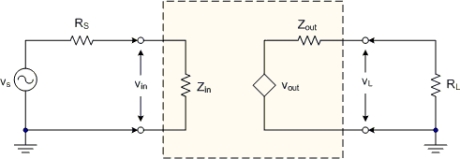
Assuming the source voltage is constant, vin if Zin decreases.
A) increases
B) decreases
C) remains unchanged

Unlock Deck
Unlock for access to all 30 flashcards in this deck.
Unlock Deck
k this deck
12
Which class of amplifier conducts throughout 360° of its input signal?
A) Class A
B) Class B
C) Class C
A) Class A
B) Class B
C) Class C

Unlock Deck
Unlock for access to all 30 flashcards in this deck.
Unlock Deck
k this deck
13
Which class of amplifier has the highest efficiency?
A) Class A
B) Class B
C) Class C
A) Class A
B) Class B
C) Class C

Unlock Deck
Unlock for access to all 30 flashcards in this deck.
Unlock Deck
k this deck
14

Assuming the source voltage is constant, vL if Zin decreases.
A) increases
B) decreases
C) remains unchanged

Unlock Deck
Unlock for access to all 30 flashcards in this deck.
Unlock Deck
k this deck
15

Effective voltage gain is always Av.
A) greater than or equal to
B) less than or equal to
C) equal to

Unlock Deck
Unlock for access to all 30 flashcards in this deck.
Unlock Deck
k this deck
16

The amplifier in Figure has the following values: Zout = 1.2 kΩ, RL = 3.3 kΩ, vout = 18.6 V. What is the value of the load voltage?
A) 13.6 V
B) 6.78 V
C) 51.3 V
D) 4.07 V

Unlock Deck
Unlock for access to all 30 flashcards in this deck.
Unlock Deck
k this deck
17
What is the dB power gain of an amplifier if Av = 20dB and Rin and Rout are equal?
A) 20dB
B) 10dB
C) -3dB
D) 40dB
A) 20dB
B) 10dB
C) -3dB
D) 40dB

Unlock Deck
Unlock for access to all 30 flashcards in this deck.
Unlock Deck
k this deck
18
An amplifier with a 100 mW input provides a 3.25 W output . What is the power gain of the amplifier?
A) 30.2 dB
B) -4.9 dB
C) 4.9 dB
D) 15.1 dB
A) 30.2 dB
B) -4.9 dB
C) 4.9 dB
D) 15.1 dB

Unlock Deck
Unlock for access to all 30 flashcards in this deck.
Unlock Deck
k this deck
19
A amplifier is normally a tuned amplifier.
A) Class A
B) Class B
C) Class C
A) Class A
B) Class B
C) Class C

Unlock Deck
Unlock for access to all 30 flashcards in this deck.
Unlock Deck
k this deck
20

Assuming the circuit voltage gain is constant, what happens to vL when Zout decreases?
A) It increases
B) It decreases
C) It remains unchanged

Unlock Deck
Unlock for access to all 30 flashcards in this deck.
Unlock Deck
k this deck
21
A class B amplifier is subject to:
A) non-linear distortion.
B) crossover distortion.
C) class C interference.
D) Answer A and B
Chapter 8 Introduction to Amplifiers Answer Key
A) non-linear distortion.
B) crossover distortion.
C) class C interference.
D) Answer A and B
Chapter 8 Introduction to Amplifiers Answer Key

Unlock Deck
Unlock for access to all 30 flashcards in this deck.
Unlock Deck
k this deck
22
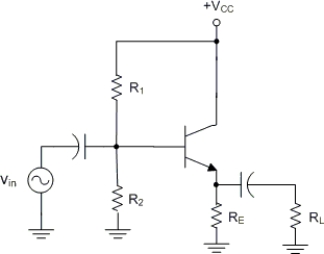
Which of the following circuit values is greater than the other two?
A) Voltage gain Av)
B) Current gain Ai)
C) Power gain Ap)

Unlock Deck
Unlock for access to all 30 flashcards in this deck.
Unlock Deck
k this deck
23
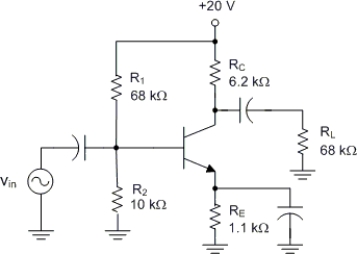
An amplifier contains a single transistor with an LC tank in its collector circuit. The amplifier is most likely a/an
A) Tuned amplifier.
B) Voltage-divider amplifier.
C) Emitter follower.
D) Reactance amplifier.

Unlock Deck
Unlock for access to all 30 flashcards in this deck.
Unlock Deck
k this deck
24

This circuit would have relatively Zin and Zout.
A) low; low
B) midrange; midrange
C) high; high
D) low; high
E) high; low

Unlock Deck
Unlock for access to all 30 flashcards in this deck.
Unlock Deck
k this deck
25

An amplifier has two transistors, one npn and one pnp. The transistor emitters are connected to each other and to the load. The amplifier is most likely a
A) Common Emitter amplifier.
B) Class A amplifier.
C) Class B amplifier.
D) Class C amplifier.

Unlock Deck
Unlock for access to all 30 flashcards in this deck.
Unlock Deck
k this deck
26
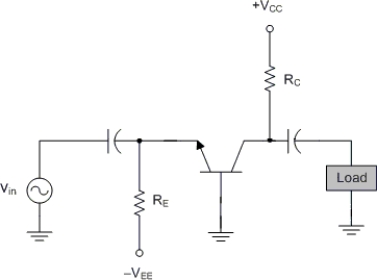
This circuit would have relatively Zin and Zout.
A) low; low
B) low; high
C) high; low
D) high; high

Unlock Deck
Unlock for access to all 30 flashcards in this deck.
Unlock Deck
k this deck
27

The circuit in Figure is a amplifier.
A) Common emitter
B) Common collector
C) Common base
D) Class C

Unlock Deck
Unlock for access to all 30 flashcards in this deck.
Unlock Deck
k this deck
28

This circuit is a
A) Class A amplifier
B) Class B amplifier
C) Class C amplifier
D) Common base amplifier

Unlock Deck
Unlock for access to all 30 flashcards in this deck.
Unlock Deck
k this deck
29

Which of the following circuit values is greater than the other two?
A) Voltage gain Av)
B) Current gain Ai)
C) Power gain Ap)

Unlock Deck
Unlock for access to all 30 flashcards in this deck.
Unlock Deck
k this deck
30

The circuit in Figure is a amplifier.
A) Common emitter
B) Common collector
C) Common base
D) Class C

Unlock Deck
Unlock for access to all 30 flashcards in this deck.
Unlock Deck
k this deck



